
Alice O'Connor, better known by her pen name Ayn Rand, was a Russian-born American writer and philosopher. She is known for her fiction and for developing a philosophical system she named Objectivism. Born and educated in Russia, she moved to the United States in 1926. After two early novels that were initially unsuccessful and two Broadway plays, she achieved fame with her 1943 novel, The Fountainhead. In 1957, Rand published her best-known work, the novel Atlas Shrugged. Afterward, until her death in 1982, she turned to non-fiction to promote her philosophy, publishing her own periodicals and releasing several collections of essays.

Objectivism is a philosophical system developed by Russian-American writer Ayn Rand. Rand first expressed Objectivism in her fiction, most notably The Fountainhead (1943) and Atlas Shrugged (1957), and later in non-fiction essays and books. Leonard Peikoff, a professional philosopher and Rand's designated intellectual heir, later gave it a more formal structure. Rand described Objectivism as "the concept of man as a heroic being, with his own happiness as the moral purpose of his life, with productive achievement as his noblest activity, and reason as his only absolute". Peikoff characterizes Objectivism as a "closed system" insofar as its "fundamental principles" were set out by Rand and are not subject to change. However, he stated that "new implications, applications and integrations can always be discovered".
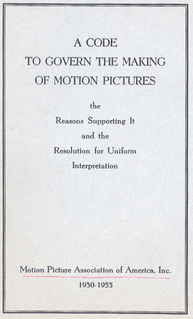
The Motion Picture Production Code was a set of industry guidelines for the self-censorship of content that was applied to most motion pictures released by major studios in the United States from 1934 to 1968. It is also popularly known as the Hays Code, after Will H. Hays, president of the Motion Picture Producers and Distributors of America (MPPDA) from 1922 to 1945. Under Hays's leadership, the MPPDA, later the Motion Picture Association of America (MPAA) and the Motion Picture Association (MPA), adopted the Production Code in 1930 and began rigidly enforcing it in 1934. The Production Code spelled out acceptable and unacceptable content for motion pictures produced for a public audience in the United States.

Anthem is a dystopian fiction novella by Russian-American writer Ayn Rand, written in 1937 and first published in 1938 in the United Kingdom. The story takes place at an unspecified future date when mankind has entered another Dark Age. Technological advancement is now carefully planned and the concept of individuality has been eliminated. A young man known as Equality 7-2521 rebels by doing secret scientific research. When his activity is discovered, he flees into the wilderness with the girl he loves. Together they plan to establish a new society based on rediscovered individualism.

We the Living is the debut novel of the Russian American novelist Ayn Rand. It is a story of life in post-revolutionary Russia and was Rand's first statement against communism. Rand observes in the foreword that We the Living was the closest she would ever come to writing an autobiography. Rand finished writing the novel in 1934, but it was rejected by several publishers before being released by Macmillan Publishing in 1936. It has since sold more than three million copies.

This is a bibliography for Ayn Rand and Objectivism. Objectivism is a philosophical system initially developed in the 20th century by Rand.

Isabel Paterson was a Canadian-American journalist, novelist, political philosopher, and a leading literary and cultural critic of her day. Historian Jim Powell has called Paterson one of the three founding mothers of American libertarianism, along with Rose Wilder Lane and Ayn Rand, who both acknowledged an intellectual debt to Paterson. Paterson's best-known work, The God of the Machine (1943), a treatise on political philosophy, economics, and history, reached conclusions and espoused beliefs that many libertarians credit as a foundation of their philosophy. Her biographer Stephen D. Cox (2004) believes Paterson was the "earliest progenitor of libertarianism as we know it today." In a letter of 1943, Rand wrote that "The God of the Machine is a document that could literally save the world ... The God of the Machine does for capitalism what Das Kapital does for the Reds and what the Bible did for Christianity."
The Waldorf Statement was a two-page press release issued on 24 November 1947, by Eric Johnston, president of the Motion Picture Association of America, following a closed-door meeting by forty-eight motion picture company executives at New York City's Waldorf-Astoria Hotel. The Statement was a response to the contempt of Congress charges against the so-called "Hollywood Ten".

Morris "Morrie" Ryskind was an American dramatist, lyricist and writer of theatrical productions and motion pictures, who became a conservative political activist later in life.
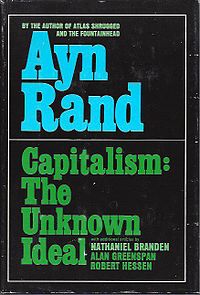
Capitalism: The Unknown Ideal is a collection of essays, mostly by the philosopher Ayn Rand, with additional essays by her associates Nathaniel Branden, Alan Greenspan, and Robert Hessen. The authors focus on the moral nature of laissez-faire capitalism and private property. They have a very specific definition of capitalism, a system they regard as broader than simply property rights or free enterprise. It was originally published in 1966.

The Fountainhead is a 1949 American black-and-white drama film produced by Henry Blanke, directed by King Vidor, and starring Gary Cooper, Patricia Neal, Raymond Massey, Robert Douglas and Kent Smith. The film is based on the bestselling 1943 novel of the same name by Ayn Rand, who also wrote the screenplay adaptation. Although Rand's screenplay was used with minimal alterations, she later criticized the editing, production design and acting.
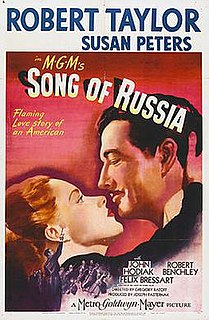
Song of Russia is a 1944 American war film made and distributed by Metro-Goldwyn-Mayer. The picture was credited as being directed by Gregory Ratoff, though Ratoff collapsed near the end of the five-month production, and was replaced by László Benedek, who completed principal photography; the credited screenwriters were Paul Jarrico and Richard J. Collins. The film stars Robert Taylor, Susan Peters, and Robert Benchley.
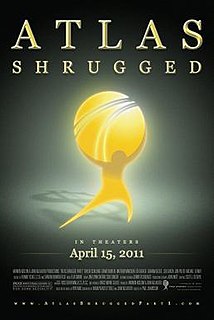
Atlas Shrugged: Part I is a 2011 American political science fiction drama film directed by Paul Johansson. An adaptation of part of the philosopher Ayn Rand's 1957 novel of the same name, the film is the first in a trilogy encompassing the entire book. After various treatments and proposals floundered for nearly 40 years, investor John Aglialoro initiated production in June 2010. The film was directed by Paul Johansson and stars Taylor Schilling as Dagny Taggart and Grant Bowler as Hank Rearden.
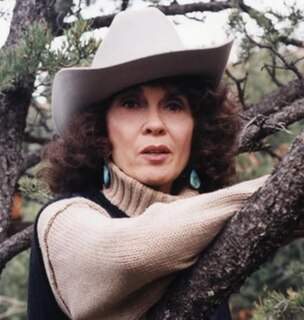
Erika Holzer was an American novelist and essayist who was a close associate of Ayn Rand. Her novel Eye for an Eye was the basis for a major motion picture of the same name. She also co-authored two nonfiction books with her husband, professor of law Henry Mark "Hank" Holzer.

The Motion Picture Association (MPA) is an American trade association representing the five major film studios of the United States, as well as the video streaming service Netflix. Founded in 1922 as the Motion Picture Producers and Distributors of America (MPPDA) and known as the Motion Picture Association of America (MPAA) from 1945 until September 2019, its original goal was to ensure the viability of the American film industry. In addition, the MPA established guidelines for film content which resulted in the creation of the Motion Picture Production Code in 1930. This code, also known as the Hays Code, was replaced by a voluntary film rating system in 1968, which is managed by the Classification and Rating Administration (CARA).

Atlas Shrugged is a 1957 novel by Ayn Rand. Her fourth and final novel, it was also her longest, and the one she considered to be her magnum opus in the realm of fiction writing. Atlas Shrugged includes elements of science fiction, mystery, and romance, and it contains Rand's most extensive statement of Objectivism in any of her works of fiction. Rand described the theme of Atlas Shrugged as "the role of man's mind in existence". The book explores a number of philosophical themes from which Rand would subsequently develop Objectivism, including reason, property rights, individualism, and capitalism, and depicts what Rand saw as the failures of governmental coercion.
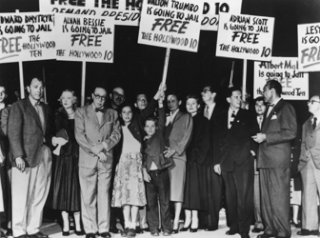
The so-called Hollywood blacklist was an entertainment industry blacklist, broader than just Hollywood, put in effect in the mid-20th century in the United States during the early years of the Cold War. The blacklist involved the practice of denying employment to entertainment industry professionals believed to be or to have been Communists or sympathizers. Not just actors, but screenwriters, directors, musicians, and other American entertainment professionals were barred from work by the studios. This was usually done on the basis of their membership in, alleged membership in, or sympathy with the Communist Party USA, or on the basis of their refusal to assist Congressional investigations into the party's activities. Even during the period of its strictest enforcement, from the late 1940s through to the late 1950s, the blacklist was rarely made explicit or easily verifiable, as it was the result of numerous individual decisions by the studios and was not the result of official legal action. Nevertheless, it quickly and directly damaged or ended the careers and income of scores of individuals working in the film industry.
Red Pawn is a screenplay written by Ayn Rand. It was the first screenplay that Rand sold. Universal Pictures purchased it in 1932. Red Pawn features the theme of the evil of dictatorship, specifically of Soviet Russia.
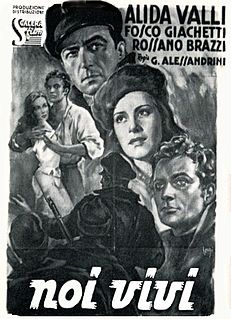
We the Living is a two-part 1942 Italian romantic war drama film, based on Ayn Rand's 1936 novel of the same name. It was originally released as two films, Noi vivi and Addio Kira. It was directed by Goffredo Alessandrini and produced by Scalera Film, and stars Alida Valli as Kira Argounova, Rossano Brazzi as Leo Kovalensky, and Fosco Giachetti as Andrei Taganov.
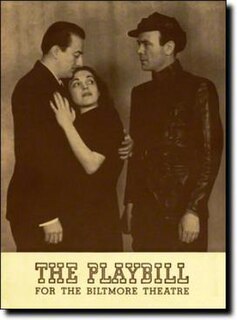
The Unconquered is a three-act play written by Russian-American author Ayn Rand as an adaptation of her 1936 novel We the Living. The story follows Kira Argounova, a young woman living in the Soviet Union in the 1920s. Her lover Leo Kovalensky develops tuberculosis. To get money for his treatment, Kira has an affair with a Communist official, Andrei Taganov. After recovering from his illness, Leo becomes involved with black market food sales that Andrei is investigating. When Andrei realizes that Kira loves Leo, he helps his rival avoid prosecution, then commits suicide. Leo leaves Kira, who decides to risk her life escaping the country.

















